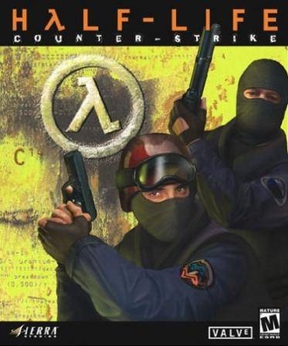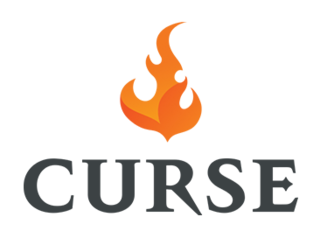Related Research Articles

Counter-Strike is a tactical first-person shooter game developed by Valve. It was initially developed and released as a Half-Life modification by Minh "Gooseman" Le and Jess Cliffe in 1999, before Le and Cliffe were hired and the game's intellectual property acquired. Counter-Strike was released by Valve for Microsoft Windows in November 2000, and is the first installment in the Counter-Strike series. Several remakes and ports were released on Xbox, as well as OS X and Linux.

The Net Yaroze is a development kit for the PlayStation video game console. It was a promotion by Sony Computer Entertainment to computer programming hobbyists which launched in June 1996 in Japan and in 1997 in other countries. It was originally called Net Yarouze, but was changed to Net Yaroze in late 1996. Yarōze means "Let's do it together".
Minh Le, also known by his online nickname Gooseman, is a Vietnamese Canadian video game programmer who co-created the Half-Life mod Counter-Strike with Jess Cliffe in 1999 and started the Counter-Strike series. He was later employed by Valve, the developers of Half-Life, and worked for 8 years in Korea on the multiplayer first-person shooter Tactical Intervention. He is a contractor on the multiplayer survival first-person shooter Rust. In the small-team games that he has worked on, Le has been a programmer, modeler, and designer.

CryEngine is a game engine designed by the German game developer Crytek. It has been used in all of their titles with the initial version being used in Far Cry, and continues to be updated to support new consoles and hardware for their games. It has also been used for many third-party games under Crytek's licensing scheme, including Sniper: Ghost Warrior 2 and SNOW. Warhorse Studios uses a modified version of the engine for their medieval RPG Kingdom Come: Deliverance. Ubisoft maintains an in-house, heavily modified version of CryEngine from the original Far Cry called Dunia, which is used in their later iterations of the Far Cry series. The Dunia engine would in turn be further modified and used in games such as The Crew 2.
Homebrew, when applied to video games, refers to software produced by hobbyists for proprietary video game consoles which are not intended to be user-programmable. The official documentation is often only available to licensed developers, and these systems may use storage formats that make distribution difficult, such as ROM cartridges or encrypted CD-ROMs. Many consoles have hardware restrictions to prevent unauthorized development.

Microsoft XNA Game Studio is a discontinued integrated development environment (IDE) for building video games on the Microsoft XNA platform. Such video games can run on Xbox 360, Microsoft Windows, Windows Phone and the Zune. XNA Game Studio is targeted at hobbyists and experienced programmers, and is primarily used to develop 2D and 3D video games for various Microsoft platforms. XNA games can be published for the Xbox 360 using an XNA Creator's Club membership, that has a yearly fee.

Kerbal Space Program (KSP) is a space flight simulation video game developed by Mexican studio Squad for Linux, macOS, Windows, PlayStation 4, PlayStation 5, Xbox Series X/S and Xbox One. In the game, players direct the space program of a species of green humanoid aliens known as "Kerbals". The game features a pseudorealistic orbital physics engine, allowing for various real-life orbital maneuvers such as Hohmann transfer orbits and orbital rendezvous.
A game creation system (GCS) is a consumer-targeted game engine and a set of specialized design tools, and sometimes also a light scripting language, engineered for the rapid iteration of user-derived video games.
Dean "Rocket" Hall is a video game designer from New Zealand. He is best known for creating the zombie apocalypse PC game DayZ, which began as a mod and was later developed into its own game under the same title. Hall left the DayZ development team in 2014 to found his own studio, RocketWerkz.
Early access, also known as alpha access, alpha founding, paid alpha, or game preview, is a funding model in the video game industry by which consumers can purchase and play a game in the various pre-release development cycles, such as pre-alpha, alpha, and/or beta, while the developer is able to use those funds to continue further development on the game. Those that pay to participate typically help to debug the game, provide feedback and suggestions, may have access to special materials in the game. The early-access approach is a common way to obtain funding for indie games, and may also be used along with other funding mechanisms, including crowdfunding. Many crowdfunding projects promise to offer access to alpha and/or beta versions of the game as development progresses; however, unlike some of these projects which solicit funds but do not yet have a playable game, all early access games offer an immediately playable version of the unfinished game to players.

Curse was a gaming company that managed the video game mod host CurseForge, wiki host Gamepedia, and the Curse Network of gaming community websites.
Stride is a free and open-source 2D and 3D cross-platform game engine originally developed by Silicon Studio. It can be used to create video games for PC, mobile devices and virtual reality.

VRChat is an online virtual world platform created by Graham Gaylor and Jesse Joudrey and operated by VRChat, Inc. The platform allows users to interact with others with user-created 3D avatars and worlds. VRChat is designed primarily for use with virtual reality headsets, being available for Microsoft Windows PCs and as an app for Android-based headsets such as the Meta Quest, Pico 4, and HTC Vive XR Elite. VRChat is also playable without a virtual reality device in a "desktop" mode designed for a mouse and keyboard, gamepad, or mobile app for touchscreen devices.
HarmonyOS (HMOS) is a distributed operating system developed by Huawei for smartphones, tablets, smart TVs, smart watches, personal computers and other smart devices. It has a microkernel design with single framework: the operating system selects suitable kernels from the abstraction layer in the case of devices that use diverse resources.

Town of Salem is an online multiplayer game with social deduction and strategy elements. It was developed and published by indie game developer BlankMediaGames, and released on December 15, 2014. Early alpha and beta versions were browser-based and free-to-play. On October 14, 2018, the game was released for iOS and Android mobile devices after a successful and long-supported Kickstarter fundraiser.

Kerbal Space Program 2 is a space flight simulation video game developed by Intercept Games and published by Private Division. It is the sequel to 2015's Kerbal Space Program and was released on early access on February 24, 2023, for Windows.

Among Us is a 2018 online multiplayer social deduction game developed and published by American game studio Innersloth. The game allows for cross-platform play; it was released on iOS and Android devices in June 2018 and on Windows later that year in November. It was ported to the Nintendo Switch in December 2020 and on the PlayStation 4, PlayStation 5, Xbox One and Xbox Series X/S in December 2021. A virtual reality adaptation, Among Us VR, was released on November 10, 2022.
The version history of the HarmonyOS distributed operating system began with the public release of the HarmonyOS 1.0 for Honor Vision smart TVs on August 9, 2019. The first expanded commercial version of the Embedded, IoT AI, Edge computing based operating system, HarmonyOS 2.0, was released on June 2, 2021, for phones, tablets, smartwatches, smart speakers, routers, and internet of things. Beforehand, DevEco Studio, the HarmonyOS app development IDE, was released in September 2020 together with the HarmonyOS 2.0 Beta. HarmonyOS is developed by Huawei. New major releases are announced at the Huawei Developers Conference (HDC) in the fourth quarter of each year together with the first public beta version of the operating system's next major version. The next major stable version is then released in the third to fourth quarter of the following year.
HarmonyOS NEXT is a proprietary distributed operating system and a major iteration of HarmonyOS, developed by Huawei to support only HarmonyOS native apps. The operating system is primarily aimed at software and hardware developers that deal directly with Huawei. It does not include Android's AOSP core and is incompatible with Android applications.
References
- ↑ Wes Fenlon (2021-06-25). "Kerbal Space Program creator looks back on leaving it behind: 'The hardest thing I've had to do in my whole life'". PC Gamer. Retrieved 2024-09-02.
- ↑ Manley, Scott (2 July 2021). "Changing lives with Kerbal Space Program". Wireframe. Raspberry Pi Press. Retrieved 10 March 2023.
By version 0.7.3, the first public release, there was a handful of parts, a planet, and enough physics such that you could get payloads into orbit if you knew what you were doing.
- ↑ Robinson, Joe (6 August 2021). ""Sustained" development of Kerbal Space Program is over as devs shift focus to KSP2". PCGamesN. Network N. Retrieved 9 March 2023.
Kerbal Space Program has been in active development since 2010, and first released to the public on June 24, 2011.
- ↑ Savage, Phil (16 December 2014). "Kerbal Space Program beta update released". PC Gamer . Retrieved 19 May 2018.
- ↑ Phillips, Tom (21 April 2015). "Kerbal Space Program is finally getting a v1.0 launch". Eurogamer.net. Gamer Network Limited. Retrieved 9 March 2023.
After years in playable alpha and beta, Kerbal will fully launch on 27th April.
- ↑ Mejia, Ozzie (15 December 2014). "Kerbal Space Program is 'Beta Than Ever' today". Shacknews. Shacknews LTD. Retrieved 9 March 2023.
- ↑ KSP_HarvesteR (2016-05-30). "My Farewell to KSP". r/KerbalSpaceProgram. Retrieved 2024-09-02.
- ↑ Andy Chalk (2016-05-31). "Kerbal Space Program lead developer calls it quits". PC Gamer. Retrieved 2024-09-02.
- ↑ "KitHack Model Club". curvegames.com. Retrieved 2025-02-04.
- ↑ ShadowZone (2024-12-24). KSA Developer Reveals Future for Kerbal Space Program Successor . Retrieved 2025-02-04– via YouTube.